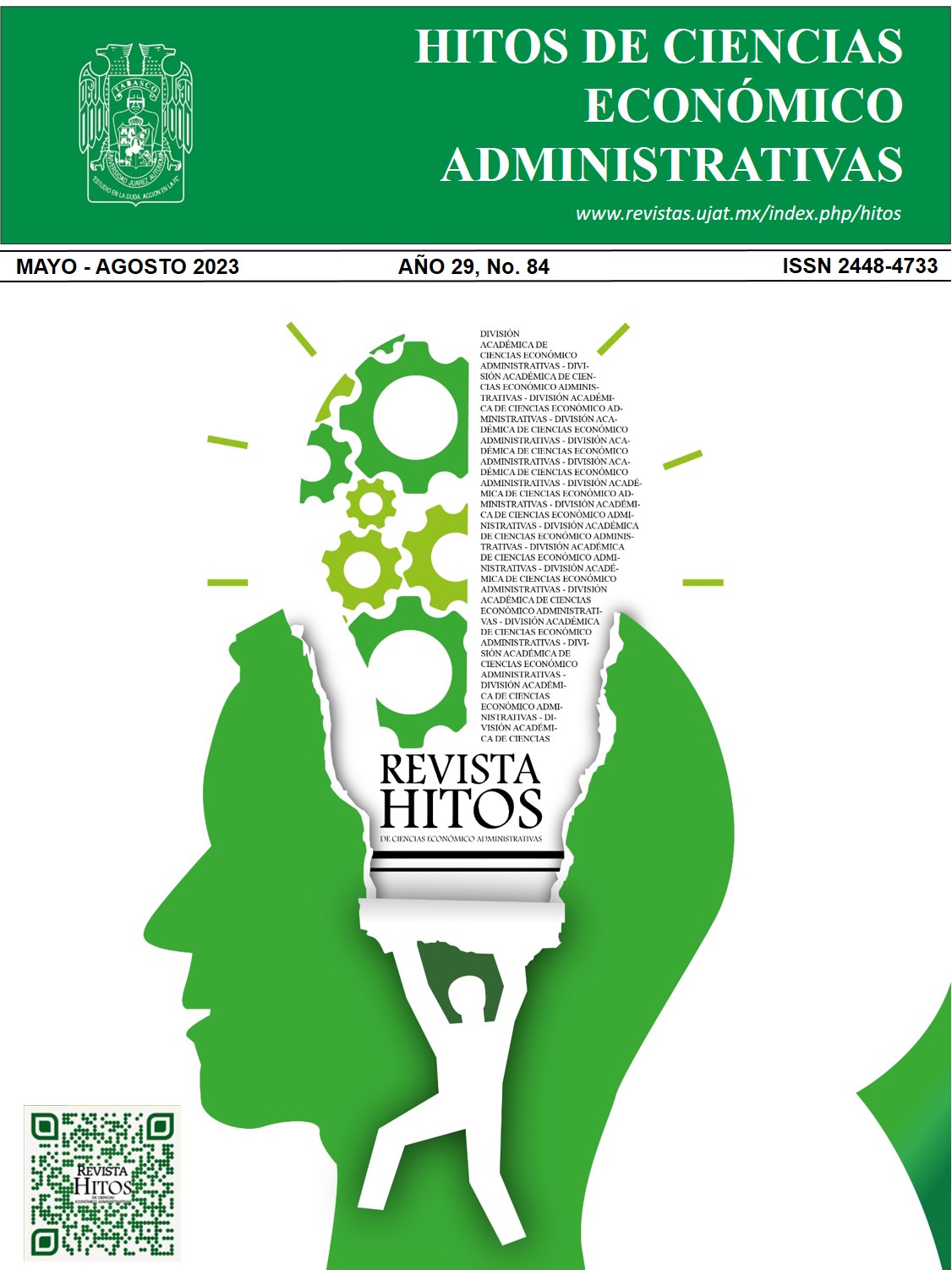Competences in Information Management (IMC), in the Training of Public Accountants
DOI:
https://doi.org/10.19136/hitos.a29n84.5795Keywords:
Information literacy, Competences, Public accountants, Information, Technologies.Abstract
OBJECTIVE: To address the study of information management competencies [IMC], required for the Public Accountant, going beyond the idea of training in the management of tools or as a user of them and moving on to those competencies that a student is expected to obtain during its formation and after it.
MATERIAL AND METHOD: The approach used was qualitative and the type of study was action research. Because it is related to the educational practice, it favored directing the work towards the observation, description and understanding of the experiences and needs of the participants.
RESULTS: This research identified the current IMC of Tadeistas public accounting students. Based on the findings and conclusions, a proposal for its development and consolidation supported by ICT was formulated and implemented, framed in the access, organization, use and evaluation of information, and addressing technical and functional, managerial, personal, interpersonal, and communication.
CONCLUSIONS: Within the framework of accounting as an information and communication system, it is essential to develop and consolidate these competencies in order to increase the relevance of the information it prepares and its usefulness for stakeholders and their decision-making processes.
Downloads
References
Association of College and Research Libraries, ACRL. (2000). Information Literacy Competency Standards for Higher Education. https://alair.ala.org/bitstream/handle/11213/7668/ACRL%20Information%20Literacy%20Competency%20Standards%20for%20Higher%20Education.pdf
Association of College and Research Libraries, ACRL. (2015). Framework for Information Literacy for Higher Education. https://www.ala.org/acrl/sites/ala.org.acrl/files/content/issues/infolit/framework.pdf
Area, M. (2008). La innovación pedagógica con TIC y el desarrollo de las competencias informacionales y digitales. Revista de Investigación en la Escuela, 64, 5-17. https://doi.org/10.12795/IE.2008.i64.01
Calimera Guidelines. (2005). Pautas de buena práctica. https://ceice.gva.es/documents/161869864/163421061/pautascalimera.pdf/9785438b-8256-4ff4-9f5c-322899391369
Castells, M. (2000). La era de la información: economía, sociedad y cultura. Alianza.
EDUTEKA. (2007). Módulo sobre Competencia para Manejar Información (CMI). http://www.eduteka.org/CMI.php
González, L. F. y Sánchez, B. (2007). Modelos para resolver Problemas de Información.EDUTEKA, Módulo sobre Competencia para Manejar Información (CMI). http://eduteka.icesi.edu.co/articulos/modelos-resolver-problemas-informacion
Hernández, R., Fernández, C. y Baptista, P. (2010). Metodología de la investigación (5° ed.). México, D.F., México: McGraw Hill Interamericana.
Hernández, R. y Mendoza, C. (2018). Metodología de la investigación: Las rutas cuantitativa y cualitativa y mixta. McGraw-Hill.
International Federation of Accountants. IFAC. (2014). International Education Standards, IES 1 to 4. https://www.ifac.org
Instituto Nacional de Contadores Públicos. (2022). Tecnologías disruptivas, aportes y desafíos para la profesión contable. https://contarte.incp.org.co/tecnologias-disruptivas-aportes-y-desafios-para-la-profesion-contable/
López García, J. (2007). ¿Qué es la competencia para manejar información(CMI)? http://www.eduteka.org/articulos/competencia-manejo-informacion
Ministerio de Educación Nacional, MEN. (2003). Resolución 3459 de 2003, Por la cual se definen las características específicas de calidad para los programas de formación profesional de pregrado en Contaduría Pública. http://www.fumc.edu.co/wp-content/
Morales, F. B. (1998). Educación Documental. Revista Educación y Biblioteca, 28. https://gredos.usal.es/bitstream/handle/10366/115320/EB10_N092_P35-38.pdf?sequence=1&isAllowed=y
Ortoll, E. (2014). Gestión del conocimiento y competencia informacional en el puesto de trabajo. [UOC Internet]: https://acortar.link/LQ3oIt
Paz, S. (2003). Investigación cualitativa en educación. Fundamentos y tradiciones. http://www.ditso.cunoc.edu.gt/articulos/80a0fe6f70c362a18b808b41699fc9bd62447d62.pdf
Roncancio, A., Mira, G. y Muñoz, N. (2017). Las competencias en la formación del profesional contable: una revisión de las posturas institucionales y educativas en Colombia. Revista Facultad de Ciencias Económicas - Universidad Militar Nueva Granada, 25(2), 83-103. https://doi.org/10.18359/rfce.3070
Stringer, E. (1999). Action research: A Handbook for Practitioners. Sage.
Universidad Jorge Tadeo Lozano. UJTL. (2012). Proyecto Educativo Institucional. https://www.utadeo.edu.co/files/collections/documents/field_attached_file/pei_2012.pdf
Universidad Jorge Tadeo Lozano. UJTL. (2015). Modelo Pedagógico. https://www.utadeo.edu.co/files/collections/documents/field_attached_file/modelo_pedagogico.pdf
Universidad Jorge Tadeo Lozano. UJTL, Programa de Contaduría Pública. (2017). Proyecto Educativo del Programa. https://www.utadeo.edu.co/es/facultad/ciencias-economicas-y-administrativas/programa/bogota/contaduria-publica
UNESCO. (2020). El enfoque de aprendizaje a lo largo de toda la vida: Implicaciones para la política educativa en América Latina y el Caribe. https://unesdoc.unesco.org/ark:/48223/pf0000373632_spa
UNESCO. (2022). Qué debe saber sobre la alfabetización. https://www.unesco.org/es/education/literacy/need-know
Universidad Nacional de General Sarmiento,UNGS. (2018). Alfabetización informacional, ALFIN: https://www.ungs.edu.ar/biblioteca/servicios/alfabetizacion-informacional
Downloads
Published
Issue
Section
License
Copyright (c) 2023 Universidad Juárez Autónoma de Tabasco

This work is licensed under a Creative Commons Attribution-NonCommercial-ShareAlike 4.0 International License.
As a requirement for the manuscript, the author is requested to provide the Copyright Assignment Letter, so that the Journal has the publication rights and to avoid plagiarism.
PLAGIARISM POLICIES
The Editorial Board of the Journal HITOS DE CIENCIAS ECONÓMICO ADMINISTRAIVAS has the authority to reject in the review process any manuscript that does not have adequate citation in the documents consulted in its scientific research work, which can be considered as plagiarism behaviors. Likewise, the referees carry out the plagiarism review using specialized software, such as iThenticate, among others.
COPYRIGHT POLICIES
Authors who have publications in the journal accept the following terms: • At the time the manuscript is accepted, the author transfers the copyright to the Journal HITOS DE CIENCIAS ECONÓMICO ADMINISTRATIVAS.
- The authors may make additional agreements for non-exclusive distribution of the published version of the article (e.g., including it in an institutional repository or publishing it in a book) provided that the initial publication in this journal is indicated.
- Authors are allowed and recommended to publish their research work on the Internet (eg, institutional or personal files), which would allow more beneficial exchanges to increase the citation of the published work.
This work is licensed under Creative Commons Attribution-NonCommercial-NoDerivatives 4.0 International





